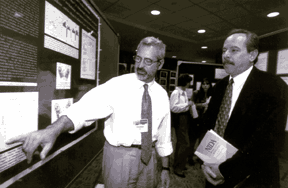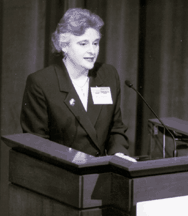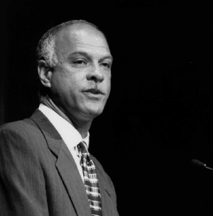NIDA's biggest-ever Town Meeting drew 450 Georgia civic leaders, policymakers, drug abuse prevention and treatment professionals, law enforcement personnel, and concerned citizens to Atlanta in May. The diverse crowd came to the meeting to learn more about how to treat drug abuse and addiction.
Atlanta Mayor Bill Campbell opened the meeting, stressing the importance of scientific research in preventing and treating drug abuse. The mayor cosponsored the event along with the governor of Georgia, Emory University, Morehouse School of Medicine, the Georgia Department of Human Resources, National Families in Action, PRIDE, and the Georgia Association for the Prevention and Treatment of Substance Abuse. Noting the broad range of cosponsors, NIDA Director Dr. Alan I. Leshner said the Town Meeting would give them the opportunity to share scientific information that they could use to deal effectively with drug addiction in communities throughout Georgia.
Town Meetings are one part of NIDA's multi-pronged effort to increase public knowledge about drug abuse and addiction. The meeting series has been conducted since1996 in cities including Chicago; Columbus, Ohio; Philadelphia; Des Moines; and Miami. NIDA dramatically extended the series' reach at the Atlanta meeting by satellite broadcasting one of the sessions on drug abuse treatment to more than 150 sites around the country.
The problem of cocaine abuse throughout Georgia made Atlanta a particularly appropriate venue for NIDA's release of a new Research Report, "Cocaine Abuse and Addiction." The report summarizes the latest scientific findings about the nature and extent of cocaine abuse and addiction, the consequences of cocaine abuse, and effective treatments for cocaine abusers. (See "New Report Provides Information on Cocaine Abuse and Treatment,")

Dr. Clinton D. Kilts of the Emory University School of Medicine shares his recent research findings on the functional anatomy of drug craving in cocaine addicts with NIDA Director Dr. Alan I. Leshner.

Dr. Elizabeth F. Howell, Georgia's State director for substance abuse services, addresses Town Meeting participants.

Atlanta Mayor Bill Campbell
Meeting participants exchanged information and explored ways to use research to strengthen local drug abuse prevention and treatment efforts. The day-long meeting featured workshops on how drug abuse affects the brain and behavior, factors that increase vulnerability or resistance to drug addiction, and innovative approaches to treatment derived from NIDA-supported research. The exchange of information continued between sessions at a research gallery where NIDA-supported scientists from Georgia shared recent research findings with drug abuse prevention and treatment providers and practitioners.
The satellite broadcast of the session on research-based treatment approaches enabled members of community anti-drug abuse coalitions around the country to take part in the session and exchange treatment information with meeting participants. The Community Anti-Drug Coalitions of America, the National Guard, and the Multi-Jurisdictional Task Force Training Program cosponsored this first nationwide telecast from a NIDA Town Meeting.
In the teleconference session, Dr. Leshner highlighted some of the key research-based principles of drug addiction treatment and explained how NIDA's initiative to develop a national drug abuse treatment clinical trials network (CTN) will bring the latest findings of drug abuse treatment research to local communities around the Nation. The CTN is developing partnerships between treatment researchers and practitioners to test, refine, and implement research-tested treatment components in local drug abuse treatment settings. The session continued with Dr. Kathleen Carroll from Yale University in New Haven, Connecticut, discussing a cognitive-behavioral treatment approach that has been effective in treating addiction to cocaine and other illicit drugs. Dr. Andrea Barthwell from the Encounter Medical Group in Chicago concluded the session by stressing the importance of linking drug addiction treatment to other health services that address the medical and social consequences of drug addiction.
